Trait Theory of Personality and the Significance of Openness to Experience
VerifiedAdded on 2023/06/17
|5
|2248
|94
AI Summary
This article discusses the trait theory of personality and the significance of openness to experience. It explores the association between openness and cognitive ability, creativity, attitude towards sex, values, and risky behavior. The article also examines the impact of openness on professional career and job changes.
Contribute Materials
Your contribution can guide someone’s learning journey. Share your
documents today.
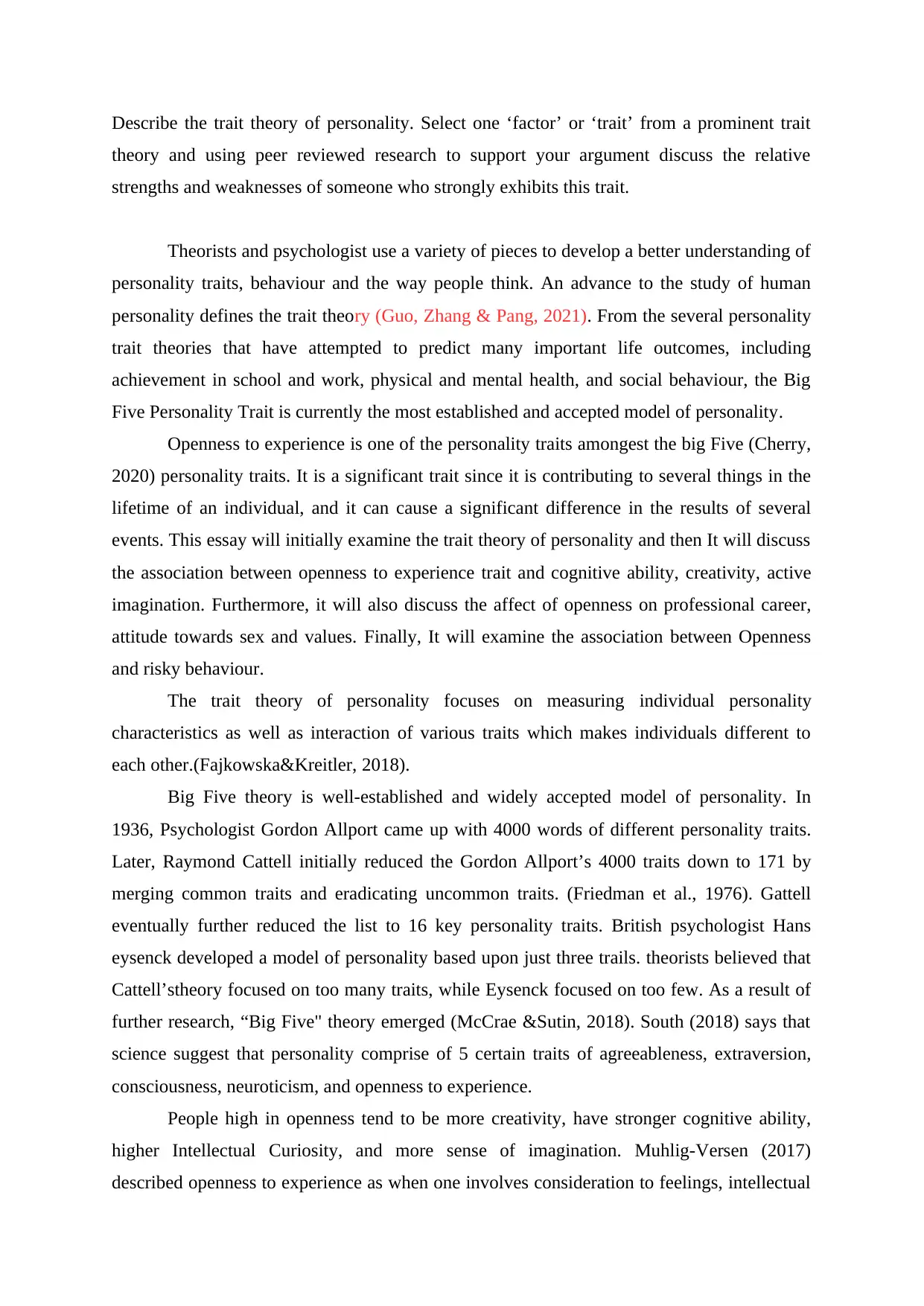
Describe the trait theory of personality. Select one ‘factor’ or ‘trait’ from a prominent trait
theory and using peer reviewed research to support your argument discuss the relative
strengths and weaknesses of someone who strongly exhibits this trait.
Theorists and psychologist use a variety of pieces to develop a better understanding of
personality traits, behaviour and the way people think. An advance to the study of human
personality defines the trait theory (Guo, Zhang & Pang, 2021). From the several personality
trait theories that have attempted to predict many important life outcomes, including
achievement in school and work, physical and mental health, and social behaviour, the Big
Five Personality Trait is currently the most established and accepted model of personality.
Openness to experience is one of the personality traits amongest the big Five (Cherry,
2020) personality traits. It is a significant trait since it is contributing to several things in the
lifetime of an individual, and it can cause a significant difference in the results of several
events. This essay will initially examine the trait theory of personality and then It will discuss
the association between openness to experience trait and cognitive ability, creativity, active
imagination. Furthermore, it will also discuss the affect of openness on professional career,
attitude towards sex and values. Finally, It will examine the association between Openness
and risky behaviour.
The trait theory of personality focuses on measuring individual personality
characteristics as well as interaction of various traits which makes individuals different to
each other.(Fajkowska&Kreitler, 2018).
Big Five theory is well-established and widely accepted model of personality. In
1936, Psychologist Gordon Allport came up with 4000 words of different personality traits.
Later, Raymond Cattell initially reduced the Gordon Allport’s 4000 traits down to 171 by
merging common traits and eradicating uncommon traits. (Friedman et al., 1976). Gattell
eventually further reduced the list to 16 key personality traits. British psychologist Hans
eysenck developed a model of personality based upon just three trails. theorists believed that
Cattell’stheory focused on too many traits, while Eysenck focused on too few. As a result of
further research, “Big Five" theory emerged (McCrae &Sutin, 2018). South (2018) says that
science suggest that personality comprise of 5 certain traits of agreeableness, extraversion,
consciousness, neuroticism, and openness to experience.
People high in openness tend to be more creativity, have stronger cognitive ability,
higher Intellectual Curiosity, and more sense of imagination. Muhlig-Versen (2017)
described openness to experience as when one involves consideration to feelings, intellectual
theory and using peer reviewed research to support your argument discuss the relative
strengths and weaknesses of someone who strongly exhibits this trait.
Theorists and psychologist use a variety of pieces to develop a better understanding of
personality traits, behaviour and the way people think. An advance to the study of human
personality defines the trait theory (Guo, Zhang & Pang, 2021). From the several personality
trait theories that have attempted to predict many important life outcomes, including
achievement in school and work, physical and mental health, and social behaviour, the Big
Five Personality Trait is currently the most established and accepted model of personality.
Openness to experience is one of the personality traits amongest the big Five (Cherry,
2020) personality traits. It is a significant trait since it is contributing to several things in the
lifetime of an individual, and it can cause a significant difference in the results of several
events. This essay will initially examine the trait theory of personality and then It will discuss
the association between openness to experience trait and cognitive ability, creativity, active
imagination. Furthermore, it will also discuss the affect of openness on professional career,
attitude towards sex and values. Finally, It will examine the association between Openness
and risky behaviour.
The trait theory of personality focuses on measuring individual personality
characteristics as well as interaction of various traits which makes individuals different to
each other.(Fajkowska&Kreitler, 2018).
Big Five theory is well-established and widely accepted model of personality. In
1936, Psychologist Gordon Allport came up with 4000 words of different personality traits.
Later, Raymond Cattell initially reduced the Gordon Allport’s 4000 traits down to 171 by
merging common traits and eradicating uncommon traits. (Friedman et al., 1976). Gattell
eventually further reduced the list to 16 key personality traits. British psychologist Hans
eysenck developed a model of personality based upon just three trails. theorists believed that
Cattell’stheory focused on too many traits, while Eysenck focused on too few. As a result of
further research, “Big Five" theory emerged (McCrae &Sutin, 2018). South (2018) says that
science suggest that personality comprise of 5 certain traits of agreeableness, extraversion,
consciousness, neuroticism, and openness to experience.
People high in openness tend to be more creativity, have stronger cognitive ability,
higher Intellectual Curiosity, and more sense of imagination. Muhlig-Versen (2017)
described openness to experience as when one involves consideration to feelings, intellectual
Secure Best Marks with AI Grader
Need help grading? Try our AI Grader for instant feedback on your assignments.
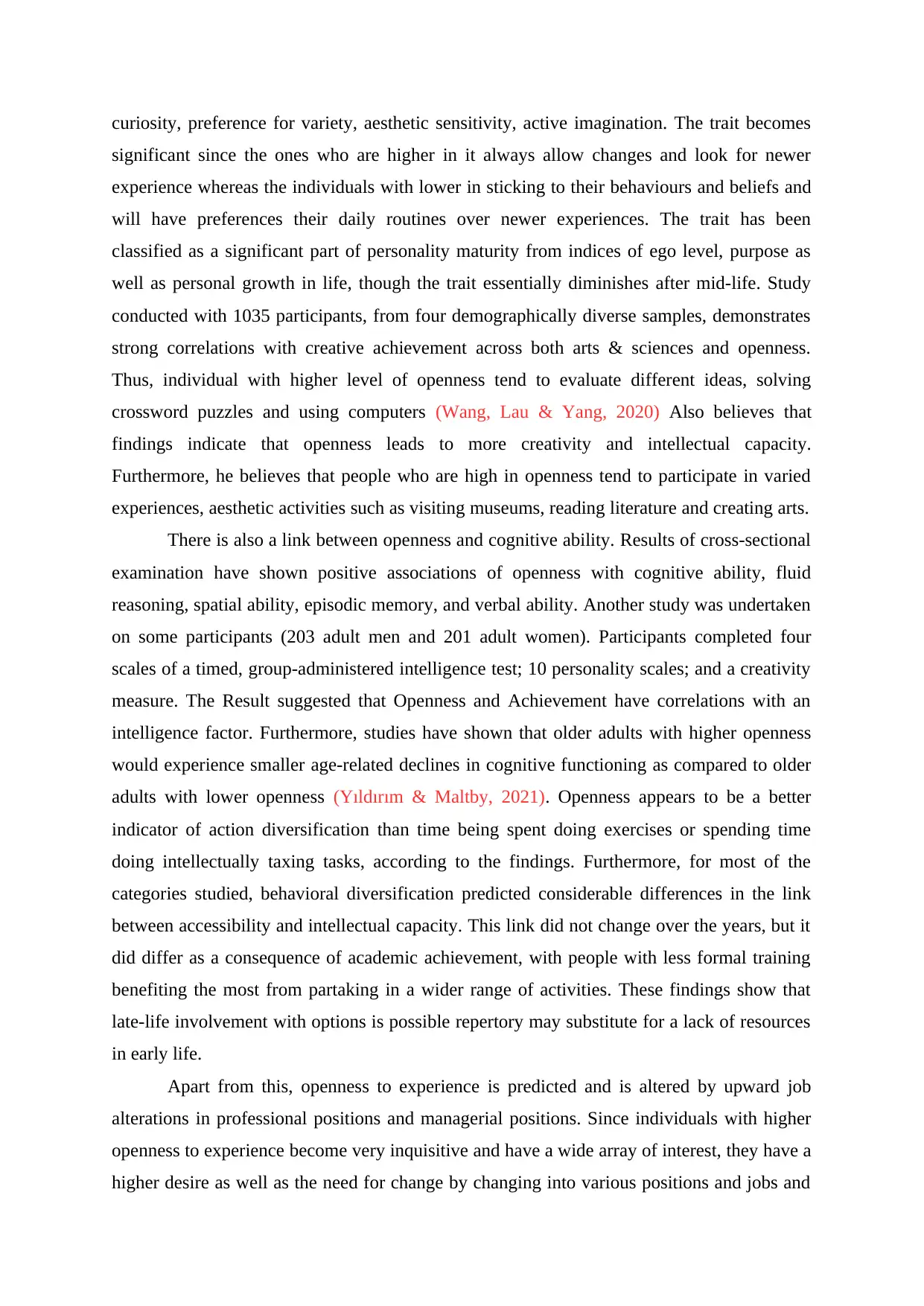
curiosity, preference for variety, aesthetic sensitivity, active imagination. The trait becomes
significant since the ones who are higher in it always allow changes and look for newer
experience whereas the individuals with lower in sticking to their behaviours and beliefs and
will have preferences their daily routines over newer experiences. The trait has been
classified as a significant part of personality maturity from indices of ego level, purpose as
well as personal growth in life, though the trait essentially diminishes after mid-life. Study
conducted with 1035 participants, from four demographically diverse samples, demonstrates
strong correlations with creative achievement across both arts & sciences and openness.
Thus, individual with higher level of openness tend to evaluate different ideas, solving
crossword puzzles and using computers (Wang, Lau & Yang, 2020) Also believes that
findings indicate that openness leads to more creativity and intellectual capacity.
Furthermore, he believes that people who are high in openness tend to participate in varied
experiences, aesthetic activities such as visiting museums, reading literature and creating arts.
There is also a link between openness and cognitive ability. Results of cross-sectional
examination have shown positive associations of openness with cognitive ability, fluid
reasoning, spatial ability, episodic memory, and verbal ability. Another study was undertaken
on some participants (203 adult men and 201 adult women). Participants completed four
scales of a timed, group-administered intelligence test; 10 personality scales; and a creativity
measure. The Result suggested that Openness and Achievement have correlations with an
intelligence factor. Furthermore, studies have shown that older adults with higher openness
would experience smaller age-related declines in cognitive functioning as compared to older
adults with lower openness (Yıldırım & Maltby, 2021). Openness appears to be a better
indicator of action diversification than time being spent doing exercises or spending time
doing intellectually taxing tasks, according to the findings. Furthermore, for most of the
categories studied, behavioral diversification predicted considerable differences in the link
between accessibility and intellectual capacity. This link did not change over the years, but it
did differ as a consequence of academic achievement, with people with less formal training
benefiting the most from partaking in a wider range of activities. These findings show that
late-life involvement with options is possible repertory may substitute for a lack of resources
in early life.
Apart from this, openness to experience is predicted and is altered by upward job
alterations in professional positions and managerial positions. Since individuals with higher
openness to experience become very inquisitive and have a wide array of interest, they have a
higher desire as well as the need for change by changing into various positions and jobs and
significant since the ones who are higher in it always allow changes and look for newer
experience whereas the individuals with lower in sticking to their behaviours and beliefs and
will have preferences their daily routines over newer experiences. The trait has been
classified as a significant part of personality maturity from indices of ego level, purpose as
well as personal growth in life, though the trait essentially diminishes after mid-life. Study
conducted with 1035 participants, from four demographically diverse samples, demonstrates
strong correlations with creative achievement across both arts & sciences and openness.
Thus, individual with higher level of openness tend to evaluate different ideas, solving
crossword puzzles and using computers (Wang, Lau & Yang, 2020) Also believes that
findings indicate that openness leads to more creativity and intellectual capacity.
Furthermore, he believes that people who are high in openness tend to participate in varied
experiences, aesthetic activities such as visiting museums, reading literature and creating arts.
There is also a link between openness and cognitive ability. Results of cross-sectional
examination have shown positive associations of openness with cognitive ability, fluid
reasoning, spatial ability, episodic memory, and verbal ability. Another study was undertaken
on some participants (203 adult men and 201 adult women). Participants completed four
scales of a timed, group-administered intelligence test; 10 personality scales; and a creativity
measure. The Result suggested that Openness and Achievement have correlations with an
intelligence factor. Furthermore, studies have shown that older adults with higher openness
would experience smaller age-related declines in cognitive functioning as compared to older
adults with lower openness (Yıldırım & Maltby, 2021). Openness appears to be a better
indicator of action diversification than time being spent doing exercises or spending time
doing intellectually taxing tasks, according to the findings. Furthermore, for most of the
categories studied, behavioral diversification predicted considerable differences in the link
between accessibility and intellectual capacity. This link did not change over the years, but it
did differ as a consequence of academic achievement, with people with less formal training
benefiting the most from partaking in a wider range of activities. These findings show that
late-life involvement with options is possible repertory may substitute for a lack of resources
in early life.
Apart from this, openness to experience is predicted and is altered by upward job
alterations in professional positions and managerial positions. Since individuals with higher
openness to experience become very inquisitive and have a wide array of interest, they have a
higher desire as well as the need for change by changing into various positions and jobs and
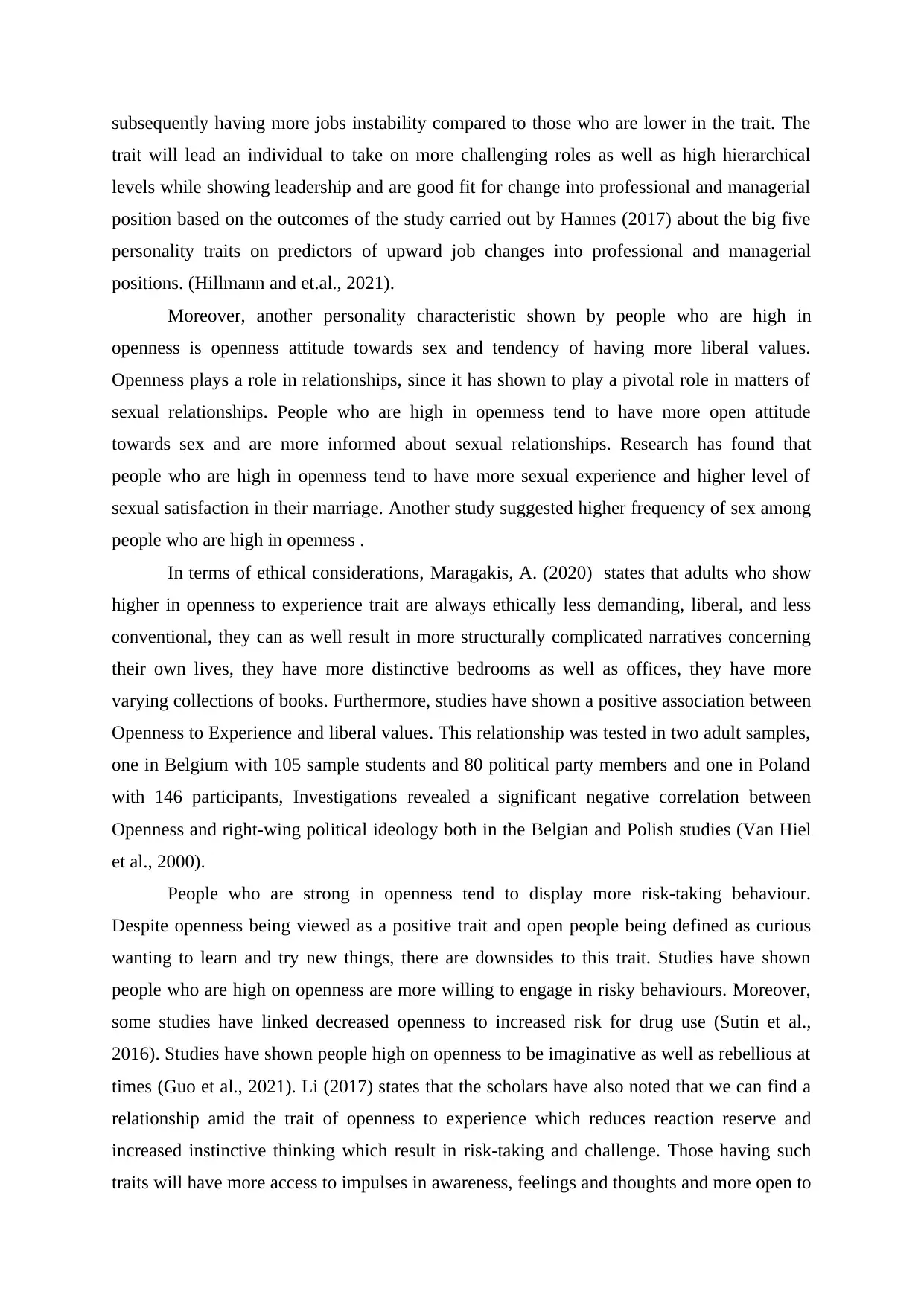
subsequently having more jobs instability compared to those who are lower in the trait. The
trait will lead an individual to take on more challenging roles as well as high hierarchical
levels while showing leadership and are good fit for change into professional and managerial
position based on the outcomes of the study carried out by Hannes (2017) about the big five
personality traits on predictors of upward job changes into professional and managerial
positions. (Hillmann and et.al., 2021).
Moreover, another personality characteristic shown by people who are high in
openness is openness attitude towards sex and tendency of having more liberal values.
Openness plays a role in relationships, since it has shown to play a pivotal role in matters of
sexual relationships. People who are high in openness tend to have more open attitude
towards sex and are more informed about sexual relationships. Research has found that
people who are high in openness tend to have more sexual experience and higher level of
sexual satisfaction in their marriage. Another study suggested higher frequency of sex among
people who are high in openness .
In terms of ethical considerations, Maragakis, A. (2020) states that adults who show
higher in openness to experience trait are always ethically less demanding, liberal, and less
conventional, they can as well result in more structurally complicated narratives concerning
their own lives, they have more distinctive bedrooms as well as offices, they have more
varying collections of books. Furthermore, studies have shown a positive association between
Openness to Experience and liberal values. This relationship was tested in two adult samples,
one in Belgium with 105 sample students and 80 political party members and one in Poland
with 146 participants, Investigations revealed a significant negative correlation between
Openness and right-wing political ideology both in the Belgian and Polish studies (Van Hiel
et al., 2000).
People who are strong in openness tend to display more risk-taking behaviour.
Despite openness being viewed as a positive trait and open people being defined as curious
wanting to learn and try new things, there are downsides to this trait. Studies have shown
people who are high on openness are more willing to engage in risky behaviours. Moreover,
some studies have linked decreased openness to increased risk for drug use (Sutin et al.,
2016). Studies have shown people high on openness to be imaginative as well as rebellious at
times (Guo et al., 2021). Li (2017) states that the scholars have also noted that we can find a
relationship amid the trait of openness to experience which reduces reaction reserve and
increased instinctive thinking which result in risk-taking and challenge. Those having such
traits will have more access to impulses in awareness, feelings and thoughts and more open to
trait will lead an individual to take on more challenging roles as well as high hierarchical
levels while showing leadership and are good fit for change into professional and managerial
position based on the outcomes of the study carried out by Hannes (2017) about the big five
personality traits on predictors of upward job changes into professional and managerial
positions. (Hillmann and et.al., 2021).
Moreover, another personality characteristic shown by people who are high in
openness is openness attitude towards sex and tendency of having more liberal values.
Openness plays a role in relationships, since it has shown to play a pivotal role in matters of
sexual relationships. People who are high in openness tend to have more open attitude
towards sex and are more informed about sexual relationships. Research has found that
people who are high in openness tend to have more sexual experience and higher level of
sexual satisfaction in their marriage. Another study suggested higher frequency of sex among
people who are high in openness .
In terms of ethical considerations, Maragakis, A. (2020) states that adults who show
higher in openness to experience trait are always ethically less demanding, liberal, and less
conventional, they can as well result in more structurally complicated narratives concerning
their own lives, they have more distinctive bedrooms as well as offices, they have more
varying collections of books. Furthermore, studies have shown a positive association between
Openness to Experience and liberal values. This relationship was tested in two adult samples,
one in Belgium with 105 sample students and 80 political party members and one in Poland
with 146 participants, Investigations revealed a significant negative correlation between
Openness and right-wing political ideology both in the Belgian and Polish studies (Van Hiel
et al., 2000).
People who are strong in openness tend to display more risk-taking behaviour.
Despite openness being viewed as a positive trait and open people being defined as curious
wanting to learn and try new things, there are downsides to this trait. Studies have shown
people who are high on openness are more willing to engage in risky behaviours. Moreover,
some studies have linked decreased openness to increased risk for drug use (Sutin et al.,
2016). Studies have shown people high on openness to be imaginative as well as rebellious at
times (Guo et al., 2021). Li (2017) states that the scholars have also noted that we can find a
relationship amid the trait of openness to experience which reduces reaction reserve and
increased instinctive thinking which result in risk-taking and challenge. Those having such
traits will have more access to impulses in awareness, feelings and thoughts and more open to
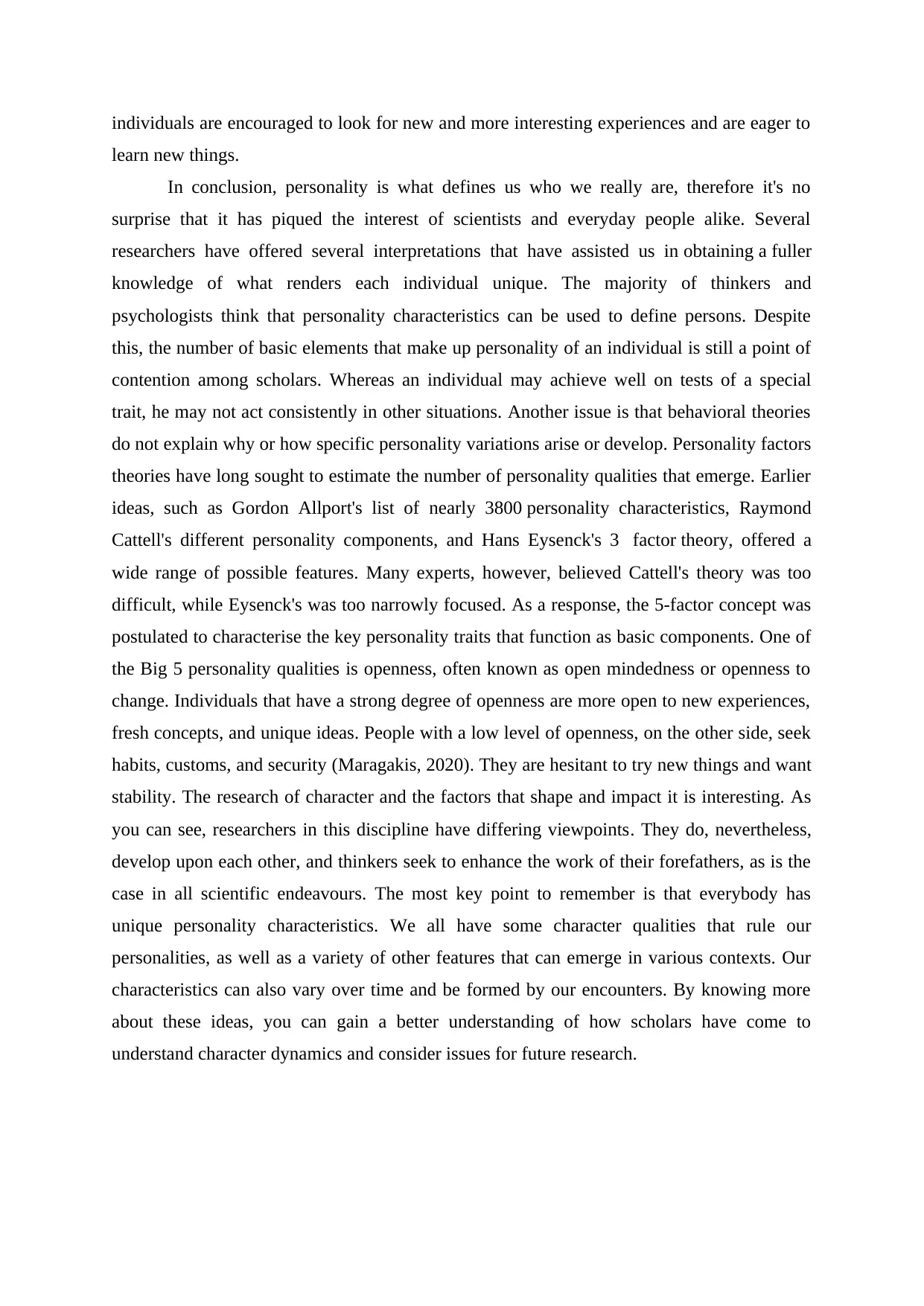
individuals are encouraged to look for new and more interesting experiences and are eager to
learn new things.
In conclusion, personality is what defines us who we really are, therefore it's no
surprise that it has piqued the interest of scientists and everyday people alike. Several
researchers have offered several interpretations that have assisted us in obtaining a fuller
knowledge of what renders each individual unique. The majority of thinkers and
psychologists think that personality characteristics can be used to define persons. Despite
this, the number of basic elements that make up personality of an individual is still a point of
contention among scholars. Whereas an individual may achieve well on tests of a special
trait, he may not act consistently in other situations. Another issue is that behavioral theories
do not explain why or how specific personality variations arise or develop. Personality factors
theories have long sought to estimate the number of personality qualities that emerge. Earlier
ideas, such as Gordon Allport's list of nearly 3800 personality characteristics, Raymond
Cattell's different personality components, and Hans Eysenck's 3 factor theory, offered a
wide range of possible features. Many experts, however, believed Cattell's theory was too
difficult, while Eysenck's was too narrowly focused. As a response, the 5-factor concept was
postulated to characterise the key personality traits that function as basic components. One of
the Big 5 personality qualities is openness, often known as open mindedness or openness to
change. Individuals that have a strong degree of openness are more open to new experiences,
fresh concepts, and unique ideas. People with a low level of openness, on the other side, seek
habits, customs, and security (Maragakis, 2020). They are hesitant to try new things and want
stability. The research of character and the factors that shape and impact it is interesting. As
you can see, researchers in this discipline have differing viewpoints. They do, nevertheless,
develop upon each other, and thinkers seek to enhance the work of their forefathers, as is the
case in all scientific endeavours. The most key point to remember is that everybody has
unique personality characteristics. We all have some character qualities that rule our
personalities, as well as a variety of other features that can emerge in various contexts. Our
characteristics can also vary over time and be formed by our encounters. By knowing more
about these ideas, you can gain a better understanding of how scholars have come to
understand character dynamics and consider issues for future research.
learn new things.
In conclusion, personality is what defines us who we really are, therefore it's no
surprise that it has piqued the interest of scientists and everyday people alike. Several
researchers have offered several interpretations that have assisted us in obtaining a fuller
knowledge of what renders each individual unique. The majority of thinkers and
psychologists think that personality characteristics can be used to define persons. Despite
this, the number of basic elements that make up personality of an individual is still a point of
contention among scholars. Whereas an individual may achieve well on tests of a special
trait, he may not act consistently in other situations. Another issue is that behavioral theories
do not explain why or how specific personality variations arise or develop. Personality factors
theories have long sought to estimate the number of personality qualities that emerge. Earlier
ideas, such as Gordon Allport's list of nearly 3800 personality characteristics, Raymond
Cattell's different personality components, and Hans Eysenck's 3 factor theory, offered a
wide range of possible features. Many experts, however, believed Cattell's theory was too
difficult, while Eysenck's was too narrowly focused. As a response, the 5-factor concept was
postulated to characterise the key personality traits that function as basic components. One of
the Big 5 personality qualities is openness, often known as open mindedness or openness to
change. Individuals that have a strong degree of openness are more open to new experiences,
fresh concepts, and unique ideas. People with a low level of openness, on the other side, seek
habits, customs, and security (Maragakis, 2020). They are hesitant to try new things and want
stability. The research of character and the factors that shape and impact it is interesting. As
you can see, researchers in this discipline have differing viewpoints. They do, nevertheless,
develop upon each other, and thinkers seek to enhance the work of their forefathers, as is the
case in all scientific endeavours. The most key point to remember is that everybody has
unique personality characteristics. We all have some character qualities that rule our
personalities, as well as a variety of other features that can emerge in various contexts. Our
characteristics can also vary over time and be formed by our encounters. By knowing more
about these ideas, you can gain a better understanding of how scholars have come to
understand character dynamics and consider issues for future research.
Secure Best Marks with AI Grader
Need help grading? Try our AI Grader for instant feedback on your assignments.
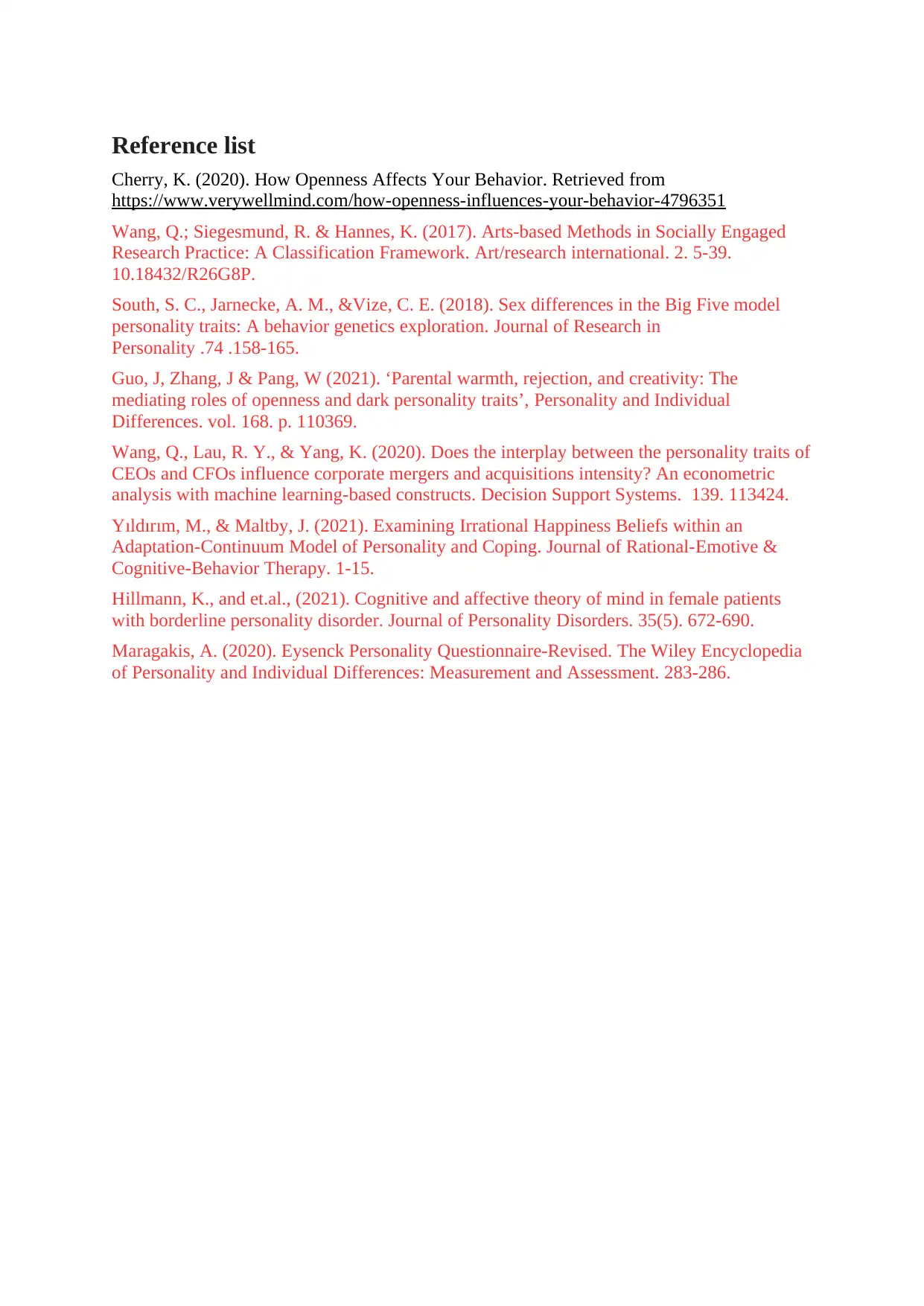
Reference list
Cherry, K. (2020). How Openness Affects Your Behavior. Retrieved from
https://www.verywellmind.com/how-openness-influences-your-behavior-4796351
Wang, Q.; Siegesmund, R. & Hannes, K. (2017). Arts-based Methods in Socially Engaged
Research Practice: A Classification Framework. Art/research international. 2. 5-39.
10.18432/R26G8P.
South, S. C., Jarnecke, A. M., &Vize, C. E. (2018). Sex differences in the Big Five model
personality traits: A behavior genetics exploration. Journal of Research in
Personality .74 .158-165.
Guo, J, Zhang, J & Pang, W (2021). ‘Parental warmth, rejection, and creativity: The
mediating roles of openness and dark personality traits’, Personality and Individual
Differences. vol. 168. p. 110369.
Wang, Q., Lau, R. Y., & Yang, K. (2020). Does the interplay between the personality traits of
CEOs and CFOs influence corporate mergers and acquisitions intensity? An econometric
analysis with machine learning-based constructs. Decision Support Systems. 139. 113424.
Yıldırım, M., & Maltby, J. (2021). Examining Irrational Happiness Beliefs within an
Adaptation-Continuum Model of Personality and Coping. Journal of Rational-Emotive &
Cognitive-Behavior Therapy. 1-15.
Hillmann, K., and et.al., (2021). Cognitive and affective theory of mind in female patients
with borderline personality disorder. Journal of Personality Disorders. 35(5). 672-690.
Maragakis, A. (2020). Eysenck Personality Questionnaire‐Revised. The Wiley Encyclopedia
of Personality and Individual Differences: Measurement and Assessment. 283-286.
Cherry, K. (2020). How Openness Affects Your Behavior. Retrieved from
https://www.verywellmind.com/how-openness-influences-your-behavior-4796351
Wang, Q.; Siegesmund, R. & Hannes, K. (2017). Arts-based Methods in Socially Engaged
Research Practice: A Classification Framework. Art/research international. 2. 5-39.
10.18432/R26G8P.
South, S. C., Jarnecke, A. M., &Vize, C. E. (2018). Sex differences in the Big Five model
personality traits: A behavior genetics exploration. Journal of Research in
Personality .74 .158-165.
Guo, J, Zhang, J & Pang, W (2021). ‘Parental warmth, rejection, and creativity: The
mediating roles of openness and dark personality traits’, Personality and Individual
Differences. vol. 168. p. 110369.
Wang, Q., Lau, R. Y., & Yang, K. (2020). Does the interplay between the personality traits of
CEOs and CFOs influence corporate mergers and acquisitions intensity? An econometric
analysis with machine learning-based constructs. Decision Support Systems. 139. 113424.
Yıldırım, M., & Maltby, J. (2021). Examining Irrational Happiness Beliefs within an
Adaptation-Continuum Model of Personality and Coping. Journal of Rational-Emotive &
Cognitive-Behavior Therapy. 1-15.
Hillmann, K., and et.al., (2021). Cognitive and affective theory of mind in female patients
with borderline personality disorder. Journal of Personality Disorders. 35(5). 672-690.
Maragakis, A. (2020). Eysenck Personality Questionnaire‐Revised. The Wiley Encyclopedia
of Personality and Individual Differences: Measurement and Assessment. 283-286.
1 out of 5
Related Documents
Your All-in-One AI-Powered Toolkit for Academic Success.
+13062052269
info@desklib.com
Available 24*7 on WhatsApp / Email
![[object Object]](/_next/static/media/star-bottom.7253800d.svg)
Unlock your academic potential
© 2024 | Zucol Services PVT LTD | All rights reserved.




